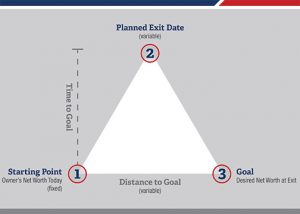When asked about succession or exit planning, have you given one of these responses?
“I think I will leave my business in three to five years.”
“The operation still needs me.”
“The business is not ready to be transitioned.”
“We are too busy to worry about succession.”
“I will easily sell it in a few years and walk away.”
“I am just not ready yet.”
 Or perhaps you know someone who has given one of these answers when discussing their potential exit from the business and retirement?
Or perhaps you know someone who has given one of these answers when discussing their potential exit from the business and retirement?
Like starting an exercise program, exit planning can easily wait until tomorrow.
However, for the Baby Boomers, tomorrow is here. Business owners born between 1945 and 1964 make up 25% of the population but own over 60% of the small businesses. The high ownership levels result from their surge into the job market in the 1970s and the lack of room in corporate America to absorb a much larger and better-educated employee population. From 1975 until the mid-1980s, Baby Boomers opened new businesses at a rate never seen before and not duplicated since.
Today, over 5,000,000 Baby Boomers are preparing for retirement. Just as when they all went to college, started new businesses, and became prolific consumers, they will create a flood of small business sales in the United States.
So, what is exit planning, and why should you do it? Also, how do you do it, and when should you start?
Exit Planning: What is it and Why do it?
When a business broker creates an “exit plan,” it usually involves listing the business for sale to a third party. An attorney’s planning focuses on the legal documents that allow the transition of a company’s assets to new ownership. An accountant or financial planner will look closely at tax and inheritance issues, and an insurance broker offers products that reduce the risk of interruption or disaster.
 It is logical then that exit planning is quickly becoming a significant focus of the legal and financial communities. Although boomers are healthier than prior generations, they all have to retire eventually. Tens of thousands of professional advisors are positioning themselves to provide tax, risk management, wealth management, and contract preparation services to this flood of sellers.
It is logical then that exit planning is quickly becoming a significant focus of the legal and financial communities. Although boomers are healthier than prior generations, they all have to retire eventually. Tens of thousands of professional advisors are positioning themselves to provide tax, risk management, wealth management, and contract preparation services to this flood of sellers.
You may be in your 40s and 50s and maybe thinking that this doesn’t apply to you. After all, you have plenty of time. However, the answer to that question is another question: then why buy life insurance? Anything can happen to any of us at any time. Exit planning is another form of insurance— just as you are making sure your family is being cared for, don’t you want the same for your business and employees?
There are many additional benefits to starting exit planning early— the process of getting your business transition ready means making it more attractive to investors. That includes, but is not limited to: maximizing revenue, lowering expenses, increasing efficiencies, eliminating owner-centric processes, getting the business modernized, up-to-speed, and more profitable. All of these will have tremendous benefits for you and your company regardless of your exit timing. Examining the strengths and weaknesses of the business, IT systems, management team, and customer base are good continual improvement practices that make the company more profitable in the short-term and make it much more attractive for a potential buyer.
How to Plan Your Exit?
 A successful transition starts by determining the planned date of exit and the post-tax proceeds required from the business to satisfy the owner. The target proceeds should be achievable in the chosen time frame. If they are not, you can extend the time frame or reduce the financial goal.
A successful transition starts by determining the planned date of exit and the post-tax proceeds required from the business to satisfy the owner. The target proceeds should be achievable in the chosen time frame. If they are not, you can extend the time frame or reduce the financial goal.
After determining schedules and financial information, there are essentially three options on whom will take over as an owner: a family member, an internal team sale, or a third-party sale. Discussions with accountants, attorneys, financial planners, and others likely feel similar to a complicated maze that makes you not even want to start the process. A trained advisor will help initiate the process and will engage in constant communication with all of the parties listed above, with your control of the process remaining intact.
The most effective and efficient approach to exit planning is to select a single professional who can manage all the others involved. Creating new entities or sale agreements is pointless unless the tax implications are first understood. Planning to reduce the impact of income taxes may be rendered moot if a company is not in a position to sell. Putting the company up for sale may be a disaster if an owner doesn’t understand what buyers are looking for and how much they’re willing to pay.
Not only will this process determine the best options for your eventual exit from your business, but it also provides a screenshot of the company. It helps to identify areas of the organization that can be improved and what we can outsource to others to achieve the highest sale value possible. Eventually, the planning also leads to a smooth transition, operationally, so that your business continues to be run in the best manner possible by new leadership.
When to Start?
 Retiring Boomers will outnumber GenXers reaching ownership age by 4,000 a day! Studies show that the generation reaching retirement age is 2.5 times more likely to want to own a business than those in their 30’s and 40’s. Thus, this severely limits the small-business buyers in our economy today.
Retiring Boomers will outnumber GenXers reaching ownership age by 4,000 a day! Studies show that the generation reaching retirement age is 2.5 times more likely to want to own a business than those in their 30’s and 40’s. Thus, this severely limits the small-business buyers in our economy today.
It often takes a minimum of 5 years to develop most succession and exit plans—a more realistic number might be as much as ten years. Time and potential buyers will likely be the two most significant challenges for you in this process. Once you have a plan in place, you can implement it whenever you chose.
Why wait until it is too late? Get the conversation started with the correct parties now. Are you ready?
The single largest transaction and transition of your life deserves special attention.
Are you planning to exit and sell your business? Business Exit planning is quickly becoming a buzzword in the legal and financial communities. Your professional advisors position themselves to provide tax, risk management, wealth management, and contract preparation services. BEST Exit Plan Advisor has been trained to manage your team of tax, legal, business, and financial planners to navigate your exit strategy. Click here for more details and a video on how to get started.
If you want to see how prepared you are for transition, take the 15-minute Assessment at no charge:

There is one indisputable fact: 100% of owners will eventually exit their business. The Assessment is a multiple-choice questionnaire that does not ask for confidential or financial information. Nevertheless, it is a critical first step in starting the discussion and planning process. Click here for more information concerning our free, no-obligation exit planning assessment.





